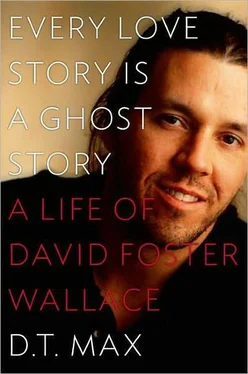At first, in Syracuse, Wallace had trouble pushing Infinite Jest forward. Change always derailed his writing. Costello had added a new keyboard to Wallace’s college computer. “I simply have to pound to get the letters to register,” he complained to Franzen. He couldn’t read some of his old drafts; he was too poor to buy a table to put it on; there were too many distractions. Wallace was, he wrote Franzen, “in a real funk about the Project” and worried his current inertia would “become a stasis that threatens to accumulate its own inertia, etc.” Franzen had made a second visit to Syracuse, this time with his wife, to look at the possibility of moving there again. The three drove down the street on which Raymond Carver had lived when he taught at the university in the 1980s. His old house was for sale. They were amazed to learn that the price was $10,000 higher because it had once been the home of a famous writer. 27Now Wallace again tried to lure him, advertising that “it’s awfully pretty here now—60s, clear, sunny, every kind of floral scent known to Linnaeus floating around.”
Over the next few months Wallace fell back into his routines. He would get up and go to a 7:15 sobriety meeting, then come back and work, next go to a gym to work out. Seeing the size of Big Craig and the other men in Granada House had made him serious about weight lifting: he now drank a protein shake every morning with raw egg in it, which he called his “breakfast vomit.” 28In the evening there was another sobriety meeting and then he would go back to work, altering and typing into his old computer what he’d written in the morning. This arrangement brought out his best writing, he felt, because the process of writing by hand and then transcribing forced his brain to wait for his hands. When he tried composing directly on a PC, it felt wrong. 29
The work moving forward again, Wallace discovered that his tiny apartment felt just right, a counterpart to the bungalow in Tucson and his senior single at Amherst, places where he didn’t feel his ass in the chair. He had gotten hold of the silver velour recliner and put it in the living room. He piled his books and papers on his bed. To sleep he moved them to the floor. He was so happy he sent Franzen pictures of his narrow slice of paradise.
For evening company, there was, by August, Mary, with whom a relationship had finally begun in earnest. “The Era of Skulking seems to be drawing to a close!” Wallace told Spark, reporting that Karr’s estranged husband had begun seeing someone. They would watch action movies together at night, both loving, as Karr told a later interviewer, “movies where shit blew up.” They worked out together and played tennis. Karr cooked for both of them and for her students. They read books out loud to each other and exchanged drafts (Karr was working on The Liar’s Club and he poached material from her life.) This was their happiest time. They went to her twentieth high school reunion in Texas and “had big big fun,” Wallace told Spark. Wallace even was willing to dance, though only to the slow music.
But no sooner were he and Karr finally a couple than problems emerged. By the fall he was mad at her for never quite integrating him into her family; she was mad at him for never thinking about anyone’s needs but his own. He responded with more protestations of love, writing from around the corner, as she remembered. “I want you to know that I AM here,” he wrote her, “I AM with you…. Mary, I am going nowhere but to you if you will have me. As you move closer to being available to me…I become more, not less, devoted to you and to my love for you and to my desire to have a life with you if you want me.”
He went on in loving quasi-complaint:
What I feel is that I’ll find no other woman whom I love this way, who makes my nervous system shimmy and Poor Old say Sig Heil as you do, who makes me laugh as belly-deep, who teaches me in so many ways she doesn’t know — as people who are real to each other teach each other, without intent or agenda — with whom I disagree in such interesting ways.
Wallace turned to his recovery groups for companionship. His sponsor, a garrulous older real estate investor with, as others remember, a spectacular sock collection, was there to give him counsel. Mostly Wallace talked to him about Karr and their unhappy relationship. “I had the impression of hurling things,” the man remembers; “you could not please Mary.” He invited Wallace to join a men’s group he was involved in, which Wallace nicknamed “the catacombs.” They would meet at different members’ houses each week, and when they got to Wallace’s they sat amid the tower of manuscript pages and piles of books. He told them he had always looked on how to get women into bed as “a physics problem”; Mary, though, obeyed no law he understood.
That fall Mark Leyner was invited to Syracuse as part of a reading series at the university. Leyner was at the height of his celebrity. He had just published Et Tu, Babe and been on the cover of the New York Times Magazine , where he had been surprised to find Wallace, with whom he had previously been friendly, call him “a kind of antichrist.” Now he smoothly worked his way through his material to the large crowd. As he riffed, he bobbed back and forth like a boxer, or the writer of the moment he was. He singled Wallace’s fiction out for praise but then made fun of alcoholism and said that people who wore bandanas reminded him of the cabin boys on The Love Boat . He insisted that the goal of writers was “to entertain,” if “in a very unique way.” At the very end, a hand came up from the back row: it was Wallace, scruffy, in a bandana. “Is it sufficient to entertain people as spectacularly as you have,” he asked now, in his thin voice, “or should there be a further moral purpose to your work?” Leyner replied that he felt entertainment was itself a moral goal and mentioned the well-known moment in Preston Sturges’s Sullivan’s Travels in which a Mickey Mouse cartoon helps convicts forget their hard lives for a moment. Wallace clearly wasn’t satisfied with Leyner’s answer — to give addicts more of the drug wasn’t to cure them — but time was up. Karr drove Leyner to the train station. Wallace, along for the ride, seemed to him grateful to be in her presence.
Ever since Boston, Wallace had been seeing therapists. Unsurprisingly, during these sessions his attention came to rest on his mother. Sometime in therapy he became certain that his mother had been abused as a child by her father. As he understood it, she had repressed the memory of the transgression and thus repression and control had become her way of dealing with the world, including the problems in her marriage. From this Wallace grew convinced, as he wrote Karr, that his mother’s hidden life—“so much hidden pain and lying”—was key to understanding his own situation. Her insistence that all was well, her desire to protect him, he believed, had set the stage for the denial of his own pain that lay behind his drug use and alcoholism. The link was so clear, he wrote Karr, that his mother might just as well have taught him “how to bartend and de-seed dope.” Once her story was unearthed, the healing might begin. The truth hurt, he wrote Karr, but, he was convinced, “it heals too.”
Wallace had entered therapy with some trepidation. He was not from a culture that routinely dug up past upsets. But Karr had encouraged him in his investigations, 30and by the time that he left for Syracuse he had blossomed into a committed therapand, as eager to ferret out the roots of his personal malaise as he’d once been to crack logical paradoxes. He went to group therapy and also had a private therapist, whom he paid cash because he had no health insurance. His hope was that his background or upbringing might at least partly explain his depressions and addictions. Yes, he had a chemical imbalance, but why? What had happened to make him into this anxious, agitated, and needy thirty-year-old?
Читать дальше












